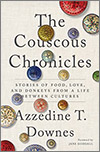Review | THE COUSCOS CHRONICLES by Azzedine Downes (Morocco)
The Couscous Chronicles
Stories of Food, Love, and Donkeys from a Life Between Cultures
by Azzedine T. Downes (Morocco 1982-85)
Reviewed by Julie R. Dargis (Morocco 1984-87)
An old friend of Azzedine and his family, and a close friend of mine, devoured the Couscous Chronicles over a weekend, munching on each story as if she were a guest at a coveted Friday couscous lunch invite.
Every Peace Corps/Morocco volunteer can recount various faux pas that ensue during such a visit, but soon enough all volunteers learn the lessons that have been maktub (written) over centuries: only eat from the triangle in front of you, wait for the host to offer you the prime real estate from the center of the mound, say the word sha’bet (truly, I’m full) only when you are ready to burst, and NEVER EVER eat with your left hand!
When I began reading my copy of the book, I only read a few pages at a time, savoring each vignette as if I were wading through a swirl of spices, each depicting a snippet of language, a cultural norm, a political nuance, and in the case of hot chilis, the need for vigilance to combat the surrounding conflict.
Azzedine began his life as a simple time traveler in the Moroccan year 1402, rising quickly through the ranks to become a respected officer in a league worthy of salute.
When I originally met Azzedine, his name was Thom Downes, a compound moniker that was always used in tandem, like the name of my site mate, Sarah-Ann. He told me that it was a dream that had beckoned him to become a Muslim, a calling he wholeheartedly and immediately embraced. According to the AI platform Perplexity, Islam is an Arabic word that means “peace, purity, submission, and obedience to the will of Almighty God” or Allah.
In his book, each story asks us to question our individual beliefs so that we might better understand ourselves, our neighbors, and the potentially divisive nature of our biases. At every turn Azzedine is faced with an unending barrage of questions surrounding his identity, to which he states: “I may be confusing, but I’m not confused.” Although each story is fueled by faith, each truth encapsulates a duality. Fraught with the religious dogma of a beloved aunt, who cautioned her nephew that his children, not being of the Catholic faith, would burn in eternal damnation. Islam offered him solace, since the prophet Muhammad is reported to have said that whoever knows and understands the 99 names of Allah will go to Paradise.
Azzedine shares life lessons on the pathway to Paradise by instilling a few simple truths. Becoming a time traveler is as easy as walking through the gates of an old city. Doing it with humor can temper, but not eliminate, the effects of violence.
Most of the people he has met around the world want a better life for themselves and their children. He cautions us, however, that how our children are raised can greatly affect their understanding of the world around them.
As a six-year-old in Jerusalem, Azzedine and Nadia’s son, Azziz, was the King of the Playground, brokering daily fighting matches during recess without a single adult intervening. In the Kingdom of Morocco, at the International School of Rabat, he was cited on the first day of school for throwing a few punches at the tallest student on the playground during “recess.” Newer pursuits, such as after-school athletics later offered Azziz an alternate means to creating community and ultimately, identity.
Amira, their daughter, adopted Bulgarian as her first language. A few years later, she awoke after nap time in tears, telling the teacher that she had lost her language. The innocence of her grief was touching, reminding me of more than the loss of language over the years.
As Azzedine crossed multiple borders, his family and friends were frozen in time, wanting him to pick up where he had left off upon his return. But as Azzedine demonstrates, when one’s outer world is in a constant state of flux, one’s inner world is equally in a state of change, growing and evolving whether one finds oneself at home or abroad.
Change is not only inevitable; it is the fundamental core of life. A lesson confirmed by his four-year-old son, Charif, who “cut his hair the first day of pre-school and wore a blue bucket hat for three months to cover the damage.” Given his aversion to homework, according to one pre-school teacher, he would never amount to anything. This was an assessment to which I could hardly agree, having witnessed Charif a year earlier, climbing up onto a chair in front of a Mac desktop computer, switching it on, and using the keyboard to access a game early in the morning, before anyone else was awake.
Back home in Morocco, Nadia was unintentionally ensnared in “Squashgate.” During a visit to the outdoor market to purchase vegetables for Friday Couscous, Nadia was denied two kilos of squash, one of the sweetest and most enjoyable ingredients of the dish. The owner of the vegetable stand that she frequented every week was not at his post, and his unknowing assistant refused to cut a parcel from a large uncut squash simply because she had walked to the market.
When Nadia’s sister learned of the incident, she returned to the vegetable stall only to learn that the squash had been cut for a customer who had rolled to the stand in a chauffeured vehicle. Incensed, she quickly intervened by calling a contact at the King’s palace. Within minutes, a motorcade of Land Rovers with palace plates made a one-block diversion to hammer home a point. Fearing the destruction of their livelihoods, the next day a large bouquet of lilies arrived with the market and vegetable stand owners. Azzedine accepted the gift as an overly sufficient gesture to resolve an event that he initially had found comical. To further smooth over any remaining ripples, Azzedine asked: “Do we not come to your shop every day, offer greetings of peace, ask after your health, wait our turn patiently, and offer thanks and peace as we leave?”
For Azzedine, navigating complex and competing global political realities had inadvertently created international incidents misaligned with his desire to achieve lasting peace. Seeds of a contentious community at the local greengrocer during Squashgate threatened Friday Cous Cous.
Azzedine’s amazing and adventurous life continues.

Azzedine T. Downes (Morocco 1982-85)
As the President and CEO of the International Fund for Animal Welfare (IFAW), he and Nadia regularly trot the globe. But this is a chapter of his life I only recently entered when we ran into each other at the Clinton Global Initiative in New York City in the Fall of 2022. Huddled against a high-top table in the lobby of the hotel ballroom, we spoke at length as if no time had passed.
He was excited about the release of the Couscous Chronicles due out the following April, and I was equally excited to read it. I had spent a lot of time with Azzedine, Nadia, and the children when they lived in Virginia. One morning when the three little ones found me asleep in the basement den, they huddled with anticipation in front of my face. When I opened my eyes, in unison, they screeched, “Barbara Bush!” I was younger, and my hair was darker at the time, and we never could determine the reason for the chosen doppelganger, but just as all the accents that he had picked up over the years were scrambled into Azzedine’s speech, perhaps all the world leaders and their spouses from the countries where they had lived were scrambled into the young minds of his children.
Beautiful young minds that have since grown and evolved, guided by their beloved “Ebbi” alongside their equally beloved and steadfast mother, Nadia, the sweet, loving, and fierce girl from Tangiers.

Julie R. Dargis (Morocco 1984-87)
•
Reviewer Julie R. Dargis, Ph.D., is a writer and poet. In addition to teaching academic writing and personal wellness courses at the California Institute for Human Science, she works internationally as a Strategic Partnership and Organizational Development Consultant. Julie.dargis@gmail.com
•
The Couscous Chronicles: Stories of Food, Love, and Donkeys from a Life Between Cultures
by Azzedine T. Downes (Morocco 1982-85)
Disruption Books
June 2023
330 pages
$19.00 (paperback), $12.99 (Kindle)

Julie Dargis generously invites us to sit down with her and — using your right hand, w’allahi — partake of this couscous feast served up by the inimitable Azzedine Downes.
It is spiced with Perplexity, AI and “squashgate.” How to time travel, raise your global children, and allow yourself to be confusing but not confused.
I finally met Azzedine and Nadia at his Politics and Prose debut in Washington, D.C. How lucky for Julie and Azzedine and Nadia to share Moroccan hospitality and a deep friendship — laced with equal parts laughter and learning — all these long, and now fraught, years.
This is really a good review of the book, as well as a tribute to the person Azzedine Downes, from an admirer who knows him and his family well. This is ndeed a beautiful review,, which has definitely aroused my interest in the book with a curious title “Couscous Chronicles”! I am definitely getting the book. Congratulations!